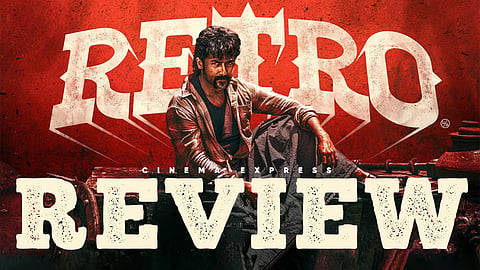Retro Movie Review: This colourful actioner loses steam in pursuit of ideological posturing
A colourful actioner loses steam in pursuit of ideological posturing(2.5 / 5)
Karthik Subbaraj’s Jigarthanda (2014) is about a filmmaker’s relentless pursuit to manifest his vision in the face of an indomitable force. A singularly focused story that also demonstrates the power of art. Karthik does something similar in Retro. What starts as a typical Tamil actioner expands to reveal a grander theme towards the end. A man’s journey to win back the love of his life ends up demonstrating the transformational power of love and laughter. In Jigarthanda, the larger commentary on the power of art manifests as a poetic dance of light from the firework that was the story. Things are not so elegant in Retro. Halfway through the middle, Karthik seems to be willing to warp, mutate, and vigorously bulk up his story, in order to reach his commentary on love, laughter, and war.
Director: Karthik Subbaraj
Cast: Suriya, Pooja Hegde, Jayaram, Joju George
After the mandatory set-ups are laid out and before the story stretches itself to connect its several discordant ideas, Retro becomes a playground for all its primary players. From Karthik Subbaraj to Suriya, Pooja Hegde, and Santhosh Narayanan, everyone gets to flex their skills, especially during the glorious single-shot wedding sequence. Even if you cynically groan, “Oh, not this again,” your indifference dissolves as your awe at the complexity and margin of error the team managed to jump over gets compounded by the minute. The sequence acts like a Tamil action film’s exaggerated interpretation of the sheer chaos of a wedding. The colourful celebrations around the happy couple, the heated conversations in the empty dinner halls before the guests pile in, and then the full-blown crisis that spills into the main hall, they all get masala-steroids in this sequence. Karthik’s distinct cinematic language, Suriya’s focused intensity, Pooja Hegde’s effortless swagger, and Santhosh Narayanan’s infectious and unrelenting commitment to having fun, both on and off-screen, keep us entertained. Much like how the sombre reality kicks in after the dreamy fantasy of a wedding in real life, we wake up to the issues of the film once again after the wedding sequence ends.
Jayaram plays a laughter therapist whose entire personality revolves around making people laugh for a living. However, except for maybe one or two instances, the character is made to look deliberately unfunny. With nothing to work on the dialogue front, Jayaram hopelessly tries to salvage the situation with ‘funny’ body language and line delivery, which ends up driving up the awkwardness. As part of an elaborate ploy, Jayaram and Suriya’s Paari, perform as clowns in front of an audience. And we see people breaking out in laughter, but we never hear the jokes ourselves. So all we see are montages of people laughing while we remain mute spectators, unable to understand what we are supposed to feel during these particular sequences. This acts like a larger analogy for many emotional moments in the film. We see Paari saddened by the lack of love from his adopted father, we see a group of islanders worshipping Paari after he is revealed as the prophesied one, and we see laughter break out among the liberated islanders as they finally overpower their tormentors. We see a lot of these supposedly emotional moments but we hardly feel it ourselves. It is fun being an audience member in a comedy show but it is frustrating when the comedian on stage starts laughing and expects you to laugh as well. We would expect the comedian to make us laugh instead of merely giving out instructions on how and when to laugh. Perhaps Jayaram’s character is Karthik’s satirical meta-commentary on the inefficacy of laughter therapy.
Retro has a colourful mix of fun comic book-ish ideas. There is a mechanical arm, a hippie villain who conducts gladiator matches, a prophesied hero with a conveniently symbolic birthmark, and the hero being trained by an East-Asian martial arts master in captivity. However, Karthik Subbaraj remains unsatisfied. You can feel his persistent effort to elevate the thematic richness of the film throughout its runtime. He achieves this to a brilliant effect in showing how Paari’s inability to smile, as a result of childhood trauma, is finally healed through a loving embrace. A poetic moment. However, such poignant, romantic, and psychological themes are still not enough for the filmmaker. He insists on packing the already stuffed film with social commentary. We get a quick trip back to the 1800s to see how the white slavers enslaved labourers in their rubber estates, which is then inherited by the Indian ruling class, the hippie spoiled rich brat villain comments on humanity’s perpetual fascination for war, Lord Krishna’s way of the warrior over Buddha’s path of non-violence, nuances of modern slavery, and for good measure we have hints of international politics and weapons trading as well.
The director’s adamant fixation on making this film ideologically dense ironically ends up showing us how functionally shallow its surface-level social commentaries are. Perhaps, failing in pursuit of greatness is no failure at all. However, the biggest frustration with Retro remains to be that it fails to recognise and respect its own light before aiming for the sun. Karthik tries to unsuccessfully tie three great wildly different ideas: Love, Laughter, and War. And perhaps, for Retro, like how it is for life itself, love alone would have sufficed.

